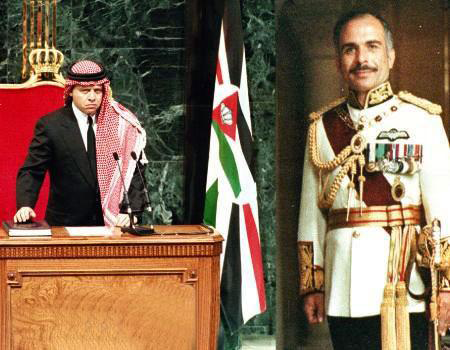AMMAN — Jordanians on Friday mark the 26th anniversary of the passing of His Majesty the late King Hussein, who died at the age of 63 on February 7, 1999, following a battle with cancer.
Also on Friday, Jordanians mark the anniversary of His Majesty King Abdullah’s assumption of constitutional powers, as he was proclaimed King on the same day.
King Hussein was born on November 14, 1935, as the eldest son of King Talal and Queen Zein Al Sharaf.
He studied at the Islamic Scientific College and then enrolled at Victoria College in Alexandria. In 1951, he entered Harrow College in England before receiving his military education at the Royal Military Academy Sandhurst in England, from which he graduated in 1953.
King Hussein was proclaimed King of Jordan on August 11, 1952, and a Regency Council was appointed until his formal Accession to the Throne on May 2, 1953, when he assumed his constitutional powers after reaching the age of 18, according to the Islamic lunar calendar.
Throughout his reign, King Hussein worked hard to improve his country and raise citizens’ standard of living. He also focused on building economic and industrial infrastructure that advanced the quality of life of the Jordanian people.
King Hussein also focused on improving education, with dozens of public and private schools, universities and colleges constructed under his rule.
He also sought to promote peace in the Middle East throughout his reign.
After the 1967 Arab-Israeli war, he was instrumental in drafting UN Security Council Resolution 242, which calls on Israel to withdraw from all Arab land occupied in the 1967 war, in exchange for peace. The resolution has served as the benchmark for all subsequent peace negotiations.
In 1991, King Hussein played a pivotal role in convening the Madrid peace conference, providing an “umbrella” for Palestinians to negotiate their future as part of a joint Jordanian-Palestinian delegation.
The 1994 peace treaty between Jordan and Israel was a major step towards achieving a just, comprehensive and lasting peace in the Middle East.
The late King’s commitment to democracy, civil liberties and human rights has also helped pave the way for Jordan to become a model state in the region.
At the time of his death on February 7, 1999, King Hussein was the longest serving executive head of state in the world.
After assuming his constitutional powers, King Abdullah has embarked on major reforms that cover political, social, economic and administrative spheres.
His Majesty formed the Royal Committee to Modernise the Political System, which was tasked with drafting new elections and political parties laws in addition to considering constitutional amendments related to these laws.
In the Speech from the Throne inaugurating the second ordinary session of the 19th Parliament, King Abdullah outlined political modernisation endeavours that aim to create broader popular participation in policy and decision making through programme-based political parties to serve development goals, empower the youth and women and mould new leaders.
Most Speeches from the Throne included clear messages on the importance of all sides of the political spectrum, primarily concerning democratic empowerment, effective citizenship and partnership.
His Majesty is also keen on visiting various areas of the Kingdom to meet with residents and listen to their concerns.
King Abdullah, the Supreme Commander of the Jordan Armed Forces-Arab Army, also attaches great importance to the army and various security apparatuses, as well as improving conditions for their personnel.
As part of the Hashemite Custodianship over Islamic and Christian holy sites in Jerusalem and under the leadership of King Abdullah, Jordan continues to perform its historical and religious role in preserving these sites. His Majesty also devotes his efforts to stress the centrality of the Palestinian issue and the significance of realising a just and comprehensive peace according to the two-state solution.
The King also exerts efforts to find political solutions to regional crises and support stability in the Middle East.
His Majesty also places importance upon realising economic integration and holding regional projects through sustained coordination and consultation with the leaders of Arab, Islamic and friendly countries, and international organisations.
